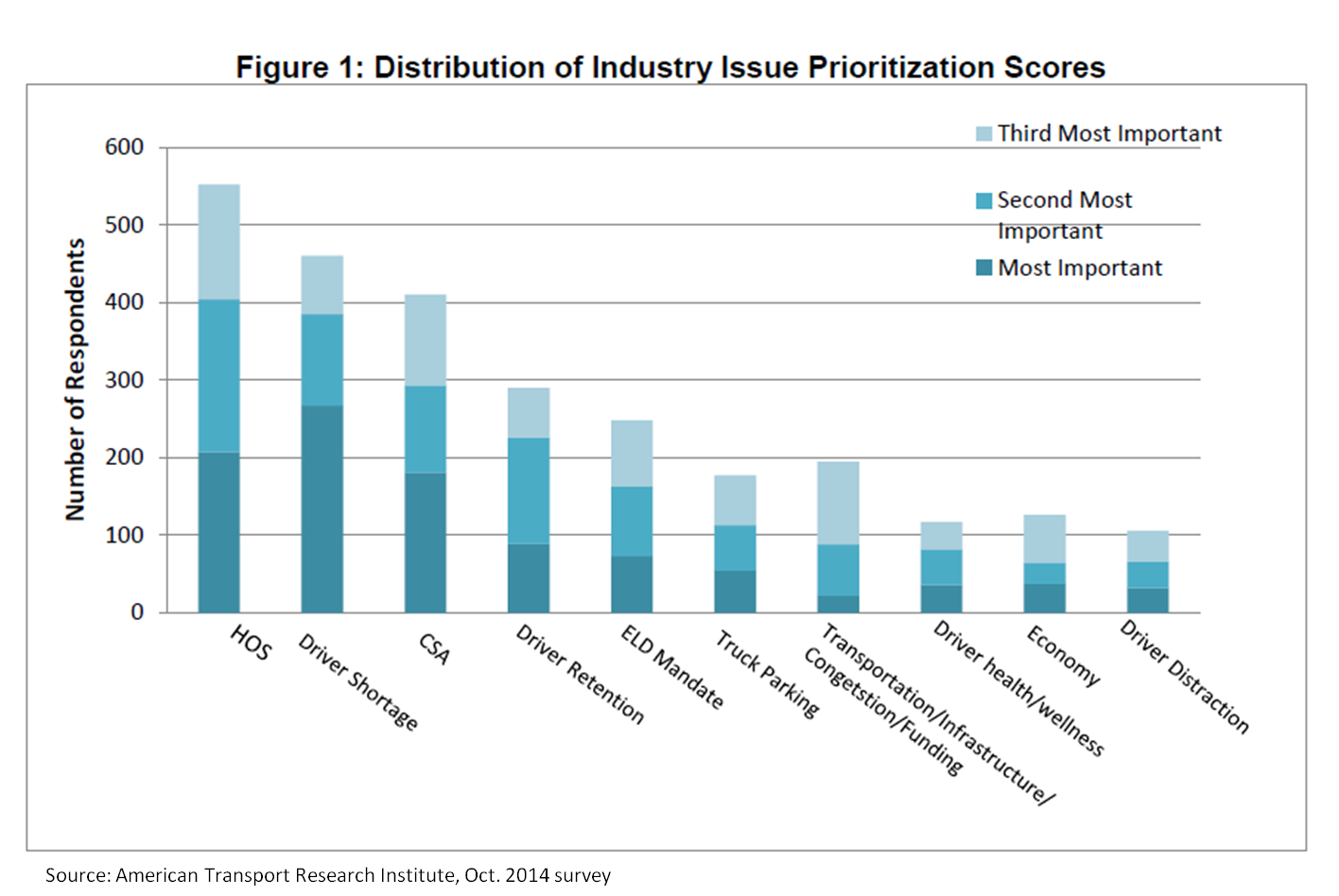Market Data

November 5, 2014
Trucking Industry Hopes Republicans Can Help With Concerns
Written by Sandy Williams
The trucking industry’s top concerns were recently highlighted in an October 2014 survey by the American Transportation Research Institute (ATRI). The ATRI report was based on the responses of 1,444 industry drivers, carriers and suppliers. Results show that Hours of Service (HOS) followed by Driver Shortage and Compliance, and Safety and Accountability (CSA) remain the top three issues for the industry.
“As was the case in 2013, the HOS rules are once again at the top of the industry’s list of concerns as the supply chain continues to experience negative impacts from the changes to the rules which went into effect in July 2013,”said the report. “Coming in as a very close second place this year is the Driver Shortage which, like the HOS rules, continues to plague the supply chain at large as motor carriers struggle to find qualified drivers to meet freight demand. Anecdotally, numerous carriers are now turning away revenue and loads due exclusively to the driver shortage, which could have an impact on economic growth as well as inflation. Rounding out the top three is CSA. Although it experienced a drop in ranking from last year, concerns over how carrier safety performance is evaluated under CSA keep it near the top of the list.”
 Dave Osiecki, American Trucking Association Executive Vice President and Head of Advocacy, spoke about regulations and politics during a conference call hosted by investment firm Stifel Nicolaus last week.
Dave Osiecki, American Trucking Association Executive Vice President and Head of Advocacy, spoke about regulations and politics during a conference call hosted by investment firm Stifel Nicolaus last week.
Osiecki noted that if Republicans take control of the Senate (which did occur during this week’s elections) it could be a mixed bag for the trucking industry.
Republicans, he said, are more likely to slow down the regulatory process through more oversight hearings and questioning in the regulatory process. “That is a potential benefit to the trucking industry to the extent that we think maybe there is some over-regulation going on,” he said.
Fourteen Republicans sided in recent months with ATA that the HOS ruling, with its 34-hour restart rule, was not justified well enough by the government. The recent election will bring leadership changes to the key transportation committees which may help in efforts to suspend the HOS ruling. A suspension amendment was attached to Senate Appropriations Committee’s funding bill last summer but went nowhere due to procedural disagreement. Osiecki said ATA will try again to attach the suspension to the appropriations bill.
Driver shortage is the second biggest concern for the trucking industry. Bobby Harris, President and CEO of BlueGrace Logistics provided some insight to the problem, which he called “the worst I have ever seen,” in an interview with the editor of Logistics Management.
“Even though there have been driver shortages in the past, there have been ebbs and flows,” said Harris. “But the problem with this one is that we have not seen a solution or a remedy or something that will work itself out in the short term. We believe that there is going to have to be something significant that takes place to address that issue; otherwise, it is going to get progressively worse. It is not just a little problem. It is a big problem, and it cannot be overemphasized at this point, as it is extremely viable to supply chains.
Increased pay and incentives are not the only answer, said Harris. “While it is nice to see increased driver pay and incentive-based initiatives, the problem is those things take drivers from other companies and they move from one carrier to another. That does not increase the driver pool. If you walk into a high school today and ask the senior class is anyone wants to drive a truck after graduation, you likely will not find one hand raised.”
Harris says the profession needs to be made more “glamorous” to attract younger drivers along with increasing pay and improving technology to make the industry more efficient. Carriers may need to turn to immigrants to fill driver positions in the meantime, he said.
CSA rules are another big concern. ATRI says crash accountability is not considered in the rules and non-preventable crashes should be removed from carrier scores. They suggest the Federal Motor Carrier Safety Administration (FMCSA) remove CSA scores from public view until a crash risk is strongly indicated for a carrier. Carriers complain that finding CSA compliant drivers is cutting into the available pool of drivers, reducing capacity and pushing up prices.







